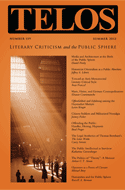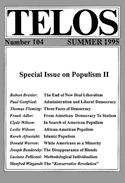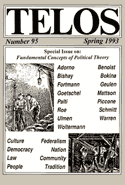By Russell A. Berman · Monday, June 18, 2012 Telos 159 (Summer 2012) is now available for purchase here.
 Edna St. Vincent Millay’s famous sonnet “If I should learn, in some quite casual way,” included in her 1917 volume Renascence and Other Poems, stages the harsh collision of private sentiment and public silence, against the backdrop of the mass culture of modernity. Seated in a crowded subway, the speaker glances at the back of a newspaper held by another commuter, only to learn of the death of a loved one, perhaps a lover, the unnamed addressee of the poem. The fact of the apathetic publication of the news underscores, through ironic contrast, the shock and the depth of private affect that cannot be expressed in the public of public transportation: “I should not cry aloud—I could not cry / Aloud, or wring my hands in such a place—” Edna St. Vincent Millay’s famous sonnet “If I should learn, in some quite casual way,” included in her 1917 volume Renascence and Other Poems, stages the harsh collision of private sentiment and public silence, against the backdrop of the mass culture of modernity. Seated in a crowded subway, the speaker glances at the back of a newspaper held by another commuter, only to learn of the death of a loved one, perhaps a lover, the unnamed addressee of the poem. The fact of the apathetic publication of the news underscores, through ironic contrast, the shock and the depth of private affect that cannot be expressed in the public of public transportation: “I should not cry aloud—I could not cry / Aloud, or wring my hands in such a place—”
Continue reading →
By Frederick Wertz · Friday, June 15, 2012 As an occasional feature on TELOSscope, we highlight a past Telos article whose critical insights continue to illuminate our thinking and challenge our assumptions. Today, Frederick Wertz looks at Franklin Adler’s “The Original Model of American Democracy and the Turn to Statism,” from Telos 104 (Summer 1995).
 In his well-known visit to the United States, Alexis de Toqueville was particularly struck by the invisibility of the American state: “Nothing strikes a European traveler in the United States more than the absence of what we would call government or administration. One knows that there are written laws there and sees them put into execution every day; everything is in motion around you, but the motive force is nowhere apparent.” At the time of his visit, the state governments of Europe were indeed gargantuan compared to that of the newly founded state across the pond. While such a gap used to be the main distinguishing characteristic between governments of the old world and new, few would disagree that today this gap has closed significantly. For better or worse, the government of the United States has taken a decidedly statist turn from its original model. In his well-known visit to the United States, Alexis de Toqueville was particularly struck by the invisibility of the American state: “Nothing strikes a European traveler in the United States more than the absence of what we would call government or administration. One knows that there are written laws there and sees them put into execution every day; everything is in motion around you, but the motive force is nowhere apparent.” At the time of his visit, the state governments of Europe were indeed gargantuan compared to that of the newly founded state across the pond. While such a gap used to be the main distinguishing characteristic between governments of the old world and new, few would disagree that today this gap has closed significantly. For better or worse, the government of the United States has taken a decidedly statist turn from its original model.
Continue reading →
By Wes Tirey · Thursday, June 14, 2012 As an occasional feature on TELOSscope, we highlight a past Telos article whose critical insights continue to illuminate our thinking and challenge our assumptions. Today, Wes Tirey looks at Alain de Benoist’s “Democracy Revisited,” from Telos 95 (Spring 1993).
 In his book Radical Democracy, C. Douglas Lummis writes that democracy is a “whore among political words.” Indeed, anyone who sees the ideals of inclusionary dialogue and autonomy that democracy is supposed to represent juxtaposed with the “democratic” endeavors of certain political actors knows quite well that democracy and its meaning are in desperate need to be revisited. Alain de Benoist does just that in his article “Democracy Revisited.” In his book Radical Democracy, C. Douglas Lummis writes that democracy is a “whore among political words.” Indeed, anyone who sees the ideals of inclusionary dialogue and autonomy that democracy is supposed to represent juxtaposed with the “democratic” endeavors of certain political actors knows quite well that democracy and its meaning are in desperate need to be revisited. Alain de Benoist does just that in his article “Democracy Revisited.”
Continue reading →
By Telos Press · Wednesday, June 13, 2012  Jens-Martin Eriksen and Frederik Stjernfelt’s The Democratic Contradictions of Multiculturalism, now available from Telos Press, explores the fundamental conceptions and political implications of culturalism and multiculturalism. “Multiculturalism” is a term that is used often in mainstream discourse, although its meaning usually goes unquestioned or unchallenged. For Eriksen and Stjernfelt, multiculturalism is either “soft” or “hard.” Soft multiculturalism allows the individual to express his or her cultural identity: it is “a system where the individual can choose to live in whatever way she or he wishes.” Hard multiculturalism, however, describes a community that uses legal and social tools to reproduce and regulate its own values; moreover, “the community may even mobilize its own police force and legal system in order to demand, to some extent or another, the conformity of individuals.” Jens-Martin Eriksen and Frederik Stjernfelt’s The Democratic Contradictions of Multiculturalism, now available from Telos Press, explores the fundamental conceptions and political implications of culturalism and multiculturalism. “Multiculturalism” is a term that is used often in mainstream discourse, although its meaning usually goes unquestioned or unchallenged. For Eriksen and Stjernfelt, multiculturalism is either “soft” or “hard.” Soft multiculturalism allows the individual to express his or her cultural identity: it is “a system where the individual can choose to live in whatever way she or he wishes.” Hard multiculturalism, however, describes a community that uses legal and social tools to reproduce and regulate its own values; moreover, “the community may even mobilize its own police force and legal system in order to demand, to some extent or another, the conformity of individuals.”
Continue reading →
By Michael Marder · Thursday, June 7, 2012 Following my recent articles in the New York Times, “If Peas Can Talks, Should We Eat Them?” and “Is Plant Liberation on the Menu,” I have been debating the question of plant ethics with Professor Gary Francione (Rutgers University). The three installments of our debate are now available on the blog of Columbia University Press: part 1, part 2, and part 3. In our discussion, Professor Francione and I have addressed issues surrounding veganism, plant sentience, anthropocentrism, environmental justice, the possibility of non-conscious intentionality, and the controversial difference between vegetal response and a mechanical reaction.
Continue reading →
By Wodek Szemberg · Wednesday, May 30, 2012 Writing at The Inside Agenda blog, Wodek Szemberg examines contemporary radicalism through the lens of Milan Kundera’s notion of “political kitsch”:
Here is another way in which Kundera describes the essence of political kitsch: “Kitsch causes two tears to flow in quick succession. The first tear says: How nice to see children running on the grass! The second tear says: How nice to be moved, together with all mankind, by children running on the grass!” It’s the second tear that is at issue. It’s one of our fundamental individual rights to be moved by children running on grass, or by puppies or kittens. The problem arises when predilection for all things sweet, cute, and peaceful is turned into political action.
Continue reading →
|
|
 Edna St. Vincent Millay’s famous sonnet “If I should learn, in some quite casual way,” included in her 1917 volume Renascence and Other Poems, stages the harsh collision of private sentiment and public silence, against the backdrop of the mass culture of modernity. Seated in a crowded subway, the speaker glances at the back of a newspaper held by another commuter, only to learn of the death of a loved one, perhaps a lover, the unnamed addressee of the poem. The fact of the apathetic publication of the news underscores, through ironic contrast, the shock and the depth of private affect that cannot be expressed in the public of public transportation: “I should not cry aloud—I could not cry / Aloud, or wring my hands in such a place—”
Edna St. Vincent Millay’s famous sonnet “If I should learn, in some quite casual way,” included in her 1917 volume Renascence and Other Poems, stages the harsh collision of private sentiment and public silence, against the backdrop of the mass culture of modernity. Seated in a crowded subway, the speaker glances at the back of a newspaper held by another commuter, only to learn of the death of a loved one, perhaps a lover, the unnamed addressee of the poem. The fact of the apathetic publication of the news underscores, through ironic contrast, the shock and the depth of private affect that cannot be expressed in the public of public transportation: “I should not cry aloud—I could not cry / Aloud, or wring my hands in such a place—”  In his well-known visit to the United States, Alexis de Toqueville was particularly struck by the invisibility of the American state: “Nothing strikes a European traveler in the United States more than the absence of what we would call government or administration. One knows that there are written laws there and sees them put into execution every day; everything is in motion around you, but the motive force is nowhere apparent.” At the time of his visit, the state governments of Europe were indeed gargantuan compared to that of the newly founded state across the pond. While such a gap used to be the main distinguishing characteristic between governments of the old world and new, few would disagree that today this gap has closed significantly. For better or worse, the government of the United States has taken a decidedly statist turn from its original model.
In his well-known visit to the United States, Alexis de Toqueville was particularly struck by the invisibility of the American state: “Nothing strikes a European traveler in the United States more than the absence of what we would call government or administration. One knows that there are written laws there and sees them put into execution every day; everything is in motion around you, but the motive force is nowhere apparent.” At the time of his visit, the state governments of Europe were indeed gargantuan compared to that of the newly founded state across the pond. While such a gap used to be the main distinguishing characteristic between governments of the old world and new, few would disagree that today this gap has closed significantly. For better or worse, the government of the United States has taken a decidedly statist turn from its original model.  In his book Radical Democracy, C. Douglas Lummis writes that democracy is a “whore among political words.” Indeed, anyone who sees the ideals of inclusionary dialogue and autonomy that democracy is supposed to represent juxtaposed with the “democratic” endeavors of certain political actors knows quite well that democracy and its meaning are in desperate need to be revisited. Alain de Benoist does just that in his article “Democracy Revisited.”
In his book Radical Democracy, C. Douglas Lummis writes that democracy is a “whore among political words.” Indeed, anyone who sees the ideals of inclusionary dialogue and autonomy that democracy is supposed to represent juxtaposed with the “democratic” endeavors of certain political actors knows quite well that democracy and its meaning are in desperate need to be revisited. Alain de Benoist does just that in his article “Democracy Revisited.”  Jens-Martin Eriksen and Frederik Stjernfelt’s The Democratic Contradictions of Multiculturalism,
Jens-Martin Eriksen and Frederik Stjernfelt’s The Democratic Contradictions of Multiculturalism, 

